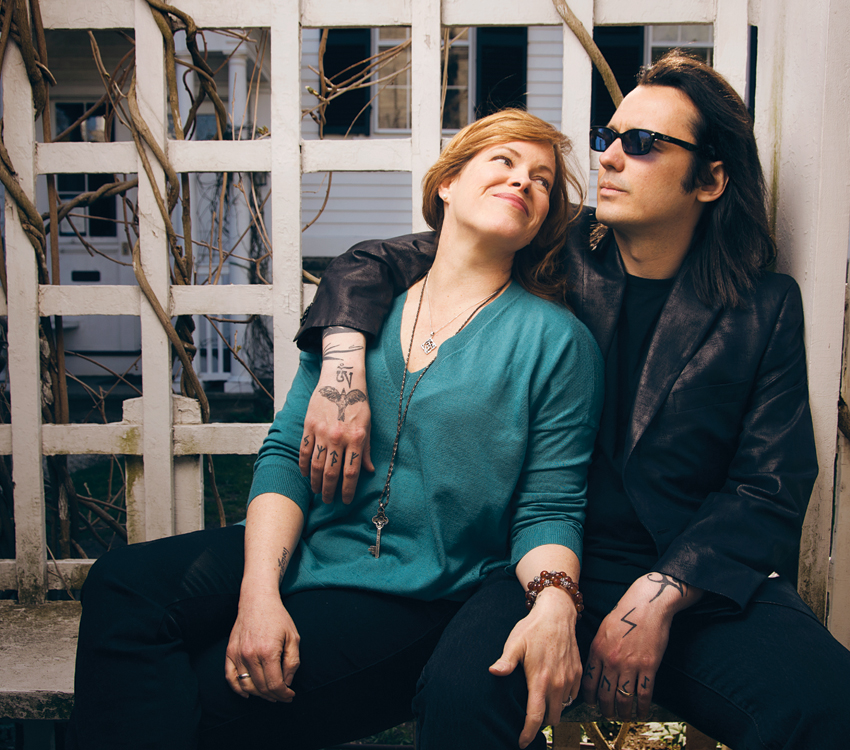Black & Blue: Damien Echols

For Davis and Echols, Salem seemed like the perfect place to live: a town with a history that had innoculated it against witch hunts. (Photo by Scott M. Lacey)
Salem was the only place Echols and Davis even considered living. They knew they’d never go back to Arkansas. And after spending a year in Manhattan, they knew they didn’t want to live there, either. The subway gave Echols panic attacks. Salem—the witch trials, the idea of this magical place that seemed to exist in perpetual autumn where different sorts of people could live without persecution or even a side eye—had been a childhood fascination, along with Halloween, cold weather, and the Red Sox, the team that seemed to him to most embody hope.
Not long after his release, Echols and Davis came to Boston to go to a Red Sox game, where they sat in the owner’s box and met Jonathan Papelbon, Echols’s favorite player at the time. The next day, they took their first trip to Salem. Davis remembers how people were kind and helpful in a way she wasn’t used to, having spent the previous two decades under constant duress. She and Echols went on a ghost tour.
“Of course, they tell you about the hangings, the witch trials and all that, but the guy says, ‘and that’s why Massachusetts is such a blue state now,’” Echols recalled. “Because we learned our lesson back then.”
One afternoon in March, Echols, 38, reclined in a cubby at the Salem tattoo shop Witch City Ink, the needle drilling into his arm a welcome distraction from the latest reporter who’d come to analyze him. He was dressed in black, his hair grown out to his shoulders, with prescription sunglasses—he can barely see without them—perched on his pale nose for most of the conversation. A liquid kale-ginger concoction rested on a shelf beside him. “I have about 20 years of bad nutrition under my belt, and I hate vegetables,” he explained. “But this is pretty harsh.” Davis, a vegetarian, has been trying to get him to eat better. He prefers steak tacos, pizza, and bagels spread with both cream cheese and butter. Echols has been serious about tattoos since he got out of prison, when one of his first stops was to a West Hollywood parlor with Johnny Depp to cover up an old self-administered tattoo, the name of a high school girlfriend. Depp and Echols chose matching hexagrams from the Chinese classic text I Ching, a symbol of moving forward and overcoming obstacles.
Echols estimates that he now has about 40 tattoos, many of them religious in nature, all of them symbolic, and all of them very new and black: old Viking runes, Chinese and Egyptian characters, dragons, angels. He enjoys the act of getting tattoos, and he likes the armor they help create—the way they help make him feel in control of how people see him. “It feels like you’ve got some sort of buffer between you and the outside world,” he says.
He also likes being able to blend in here in Salem, where any given afternoon on Essex Street—which is lined with shops hawking spells, tarot readings, and magical merchandise such as potions and voodoo dolls—might include an encounter with a fuchsia-haired psychic, or a guy dressed up as a pirate. It is at once quaint and completely contrived. Davis says that it hasn’t been easy to make friends as adults in a new town, but Echols disagrees. “People just come right up and talk to you,” he says.
“To you, they do,” she corrects him.
“People have the sense that they know me before they even meet me,” Echols explains. “Though most want to tell you their stories, not hear yours. They want to tell you about the bad hardships going on in their lives, to pour out whatever baggage they have.” Or they give him presents: drawings, a light switch fashioned in his likeness, jewelry for Davis, a painting of his upper body with the lower half of a centaur. In many ways, he becomes who they want him to be.
Lucia Coale and her husband, Ed Schutte, found out about their new neighbors back in September, not long after Davis and Echols had signed the papers on the 1810 Colonial a few houses down. Someone on the street sent out an email: “Oh my gosh, guess who’s moving here?” Coale remembers it saying. “We all went through a period where we checked [Echols] out on the Internet and watched Paradise Lost.” Coale herself began to follow Echols on Twitter, which is how she learned that weeks after they’d moved in, he and Davis still didn’t own a TV, which meant that every time Echols had a television appearance, which in those days was often, they were heading down to the Hawthorne Hotel to watch it.
Some time later, Coale and Schutte were out on a bike ride when they saw Echols and Davis out walking. “I tend to be a very chatty person, so I just kind of walked up and I said, ‘Hi, you don’t know me, but I’m your neighbor,’” Coale recalled. They invited Echols and Davis over to watch TV whenever they wanted. “I didn’t know we would become friends with them,” Schutte said. “Are you going to be friends with someone who was in solitary confinement for years? How would that work?”
But it did. The men talked about music. The women went to yoga. They all loved Mexican food and laughed at the same jokes. They didn’t talk about prison, unless Echols brought it up, and after meeting Echols in person Coale and Schutte said they had no doubt of his innocence.


